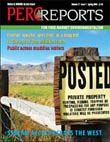
I’m torn. Some of my fondest Montana memories come from days of fly-fishing publicly accessed streams. In contrast, I’ve also conducted redd counts on one of the state’s most highly contested “stream access” streams and witnessed first-hand the natural resource benefits of privatization. Personally, I would like to see a mix between public and private access based on the size of the stream and an ecological ranking system. For example, privatizing access to high-ranking spawning tributaries and leaving the larger, more resilient, rivers open to the public; thus creating incentives from both public and private parties to effectively manage the resource.
—Chris Corbin
OWNING THE RIVER
The underlying premise of several of your articles in the spring issue of PERC Reports is that rivers can be privately owned. Awfully conceited of man to think he can own a river. So much of life depends on rivers. If I could own one, I’m not sure I’d want the responsibility. Just like a river, we’re all just passing by. Best we focus on being good stewards of the uplands and leave the rivers to do what they do best.
—Rick Craiger
SUPPLEMENTAL LICENSE FEES
I just read Randy Simmons’ article [Utah’s access decision could backfire on anglers] on stream access in PERC Reports and liked his moderated tone. I think the fly-fishing community in Utah is reasonably enlightened on the property rights perspective at this point and there should be an opportunity to reach a compromise next year. I do think there should be public access to navigable streams wherever landownership is highly fragmented (as on the Blacksmith Fork), but not in situations like the one Simmons described. What bothers the angling community is the “waste” of potentially excellent habitat by ranchers or others who have no appreciation of the potential value of the resource they control, and no regard for the common pool dimensions of the resource. In our view, the market just doesn’t work (or work quickly enough) in too many of these cases.
What I would like to see is a program of incentives to jump start the market and to encourage landowners to respect common pools. I could support supplemental license fees to subsidize private landowners who make habitat improvements so long as they are willing to sell access rights to anglers who pay the supplemental fees. Too often, private waters are accessible only to people who can pay thousands of dollars to join a club or spend a week on a plush dude ranch. Private landowners do a good job of meeting angling demand at the ultra high end of the market, but there is very little available for the other 95% of us.
—Michael Lyons


